Anthony McIntyre's Blog, page 1164
January 31, 2018
The Man Who Jumped
The Uri Avnery Column has a high regard for Marxist historian Isaac Deutscher.
A man lives in a house that catches fire. To save his life, he jumps out of the window. He lands on a passer-by in the street below and injures him grievously. Between the two a bitter enmity arises. Who is to blame?
Of course, no parable can reflect reality exactly. The man who jumped out of the burning house did not land on this particular passer-by by chance. The passer-by became an invalid for life. But on the whole, this parable is better than any other I know.
Deutscher did not provide an answer to the question of how to solve the conflict. Are the two condemned to fight each other forever? Is there a solution at all?
Common Sense would say: of course there is. True, the injured person cannot be restored to his former condition. The man who caused the injury cannot return to his former home, which was destroyed by the fire. But…
But the man can – and must – apologize to his victim. That is the minimum. He can – and must – pay him compensation. That is what justice demands. But then the two can become friends. Perhaps even partners.
Instead, the man continues to harm the victim. He invades the victim's home and throws him out. The victim's sons try to evict the man. And so it goes on.
Deutscher himself, who fled the Nazis from Poland to England in time, did not see the continuation of the story. He died a few days after the Six-day War.
Instead quarreling endlessly about who was right and who was wrong, how wonderful we are and how abhorrent the others are, we should think about the future.
What do we want? What kind of a state do we want to live in? How do we end the occupation, and what will come after?
Israel is divided between "Left" and "Right". I don't like these terms – they are obvious misnomers. They were created in the French National Assembly more than two hundred years ago by the accidental seating of the parties in the hall at the time, as seen by the speaker. But let's use them for convenience sake.
The real division is between those who prefer the people to the land, and those who prefer the land to the people. Which is more sacred?
In the early days of the state there was a joke making the rounds. God summoned David Ben-Gurion and told him: you have done great things for my people, make a wish and I shall grant it.
Ben-Gurion answered: I wish that Israel will be a Jewish state, that it will encompass all the country between the Mediterranean Sea and the Jordan River and that it be a just state.
"That is too much even for me," God said. "But I will grant you two of your three wishes."
Since then we have the choice between a Jewish and just state in part of the country, or a Jewish state in all the country that will not be just, or a greater and just state, that will not be Jewish.
Ben-Gurion must be weeping in his grave.
So What are the solutions proposed by the two major forces in Israeli politics?
The "Left" has by now an orderly program. I am proud of having contributed to it. It says, more or less:
1. A State of Palestine will come into being next to the State of Israel.
2, Between the two states there will be peace, based on an agreement that will provide for open borders and close mutual relations.
3. There will be joint institutions as necessary, by consent.
4. The united city of Jerusalem will be the capital of both states, West Jerusalem the capital of Israel and East Jerusalem the capital of Palestine.
5. There will be a limited, agreed, one-to-one exchange of territory.
6. There will be a limited, symbolic return of refugees to Israel, all other refugees will receive generous compensation and "return" to the State of Palestine or remain where they are.
7. Israel will remain a mainly Jewish state, with Hebrew as its first official language and open for Jewish immigration according to its laws.
8. Both states will join regional institutions.
This is a clear picture of the future. Both ardent Zionists and non-Zionists can accept it wholeheartedly.
What Is the program of the "Right"? How do its ideologues see the future?
The simple fact is that the Right has no picture of the future, no program, not even a dream. Only vague sentiments.
That may be its strength. Sentiments are a strong force in the life of nations.
What the Right would really like is the endless continuation of the present situation: the military occupation of the West Bank and East Jerusalem, and the indirect occupation of the Gaza Strip, enforced by blockade.
Cold logic says that this is an unnatural situation that cannot go on forever. Sooner or later it has to be institutionalized. How?
There are two possibilities, and only two: an apartheid state or a binational state.
That is so obvious, that even the most fanatical right-winger cannot deny it. No one even tries to.
There is a vague hope that the Arabs in Palestine will somehow pack up and just go away. That will not happen. The unique circumstances of 1948 will not and cannot repeat themselves.
A few well-to-do Palestinians may actually leave for London or Rio de Janeiro, but their demographic weight will remain negligible. The mass of people will remain where they are - and multiply.
Already now, there live between the sea and the river, in the Greater Israel of the dream, according to the last count (July 2016): 6,510,894 Arabs and 6,114,546 Jews. The Arab birthrate is bound to fall, but so will the Jewish one (except for the Orthodox).
What would life be like in the Israeli apartheid state? One thing is certain: it would not attract masses of Jews. The split between Jewish Israelis and Jews in the USA and other countries would widen slowly and inexorably.
Sooner or later, the disenfranchised majority would rise, world opinion would condemn and boycott Israel, and the apartheid system would break down. What would remain?
What would remain is the thing almost all Israelis dread: the binational State. One person – one vote. A country very different from Israel. A country from which many Israeli Jews would depart, either slowly or rapidly.
This is not propaganda, but simple fact. If there is a right-wing ideologue somewhere who has an answer to this – let them stand up now, before it is too late.
I Cannot resist the temptation of telling again the old joke:
A drunken British lady stands on the deck of the Titanic, with a glass of whisky in her hand, and sees the approaching iceberg. "I did ask for some ice," she exclaims, "but this is ridiculous!"
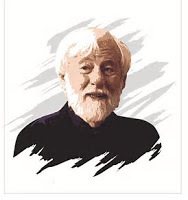 Uri Avnery is a veteran Israeli peace activist. He writes @ Gush Shalom
Uri Avnery is a veteran Israeli peace activist. He writes @ Gush Shalom


A man lives in a house that catches fire. To save his life, he jumps out of the window. He lands on a passer-by in the street below and injures him grievously. Between the two a bitter enmity arises. Who is to blame?
Of course, no parable can reflect reality exactly. The man who jumped out of the burning house did not land on this particular passer-by by chance. The passer-by became an invalid for life. But on the whole, this parable is better than any other I know.
Deutscher did not provide an answer to the question of how to solve the conflict. Are the two condemned to fight each other forever? Is there a solution at all?
Common Sense would say: of course there is. True, the injured person cannot be restored to his former condition. The man who caused the injury cannot return to his former home, which was destroyed by the fire. But…
But the man can – and must – apologize to his victim. That is the minimum. He can – and must – pay him compensation. That is what justice demands. But then the two can become friends. Perhaps even partners.
Instead, the man continues to harm the victim. He invades the victim's home and throws him out. The victim's sons try to evict the man. And so it goes on.
Deutscher himself, who fled the Nazis from Poland to England in time, did not see the continuation of the story. He died a few days after the Six-day War.
Instead quarreling endlessly about who was right and who was wrong, how wonderful we are and how abhorrent the others are, we should think about the future.
What do we want? What kind of a state do we want to live in? How do we end the occupation, and what will come after?
Israel is divided between "Left" and "Right". I don't like these terms – they are obvious misnomers. They were created in the French National Assembly more than two hundred years ago by the accidental seating of the parties in the hall at the time, as seen by the speaker. But let's use them for convenience sake.
The real division is between those who prefer the people to the land, and those who prefer the land to the people. Which is more sacred?
In the early days of the state there was a joke making the rounds. God summoned David Ben-Gurion and told him: you have done great things for my people, make a wish and I shall grant it.
Ben-Gurion answered: I wish that Israel will be a Jewish state, that it will encompass all the country between the Mediterranean Sea and the Jordan River and that it be a just state.
"That is too much even for me," God said. "But I will grant you two of your three wishes."
Since then we have the choice between a Jewish and just state in part of the country, or a Jewish state in all the country that will not be just, or a greater and just state, that will not be Jewish.
Ben-Gurion must be weeping in his grave.
So What are the solutions proposed by the two major forces in Israeli politics?
The "Left" has by now an orderly program. I am proud of having contributed to it. It says, more or less:
1. A State of Palestine will come into being next to the State of Israel.
2, Between the two states there will be peace, based on an agreement that will provide for open borders and close mutual relations.
3. There will be joint institutions as necessary, by consent.
4. The united city of Jerusalem will be the capital of both states, West Jerusalem the capital of Israel and East Jerusalem the capital of Palestine.
5. There will be a limited, agreed, one-to-one exchange of territory.
6. There will be a limited, symbolic return of refugees to Israel, all other refugees will receive generous compensation and "return" to the State of Palestine or remain where they are.
7. Israel will remain a mainly Jewish state, with Hebrew as its first official language and open for Jewish immigration according to its laws.
8. Both states will join regional institutions.
This is a clear picture of the future. Both ardent Zionists and non-Zionists can accept it wholeheartedly.
What Is the program of the "Right"? How do its ideologues see the future?
The simple fact is that the Right has no picture of the future, no program, not even a dream. Only vague sentiments.
That may be its strength. Sentiments are a strong force in the life of nations.
What the Right would really like is the endless continuation of the present situation: the military occupation of the West Bank and East Jerusalem, and the indirect occupation of the Gaza Strip, enforced by blockade.
Cold logic says that this is an unnatural situation that cannot go on forever. Sooner or later it has to be institutionalized. How?
There are two possibilities, and only two: an apartheid state or a binational state.
That is so obvious, that even the most fanatical right-winger cannot deny it. No one even tries to.
There is a vague hope that the Arabs in Palestine will somehow pack up and just go away. That will not happen. The unique circumstances of 1948 will not and cannot repeat themselves.
A few well-to-do Palestinians may actually leave for London or Rio de Janeiro, but their demographic weight will remain negligible. The mass of people will remain where they are - and multiply.
Already now, there live between the sea and the river, in the Greater Israel of the dream, according to the last count (July 2016): 6,510,894 Arabs and 6,114,546 Jews. The Arab birthrate is bound to fall, but so will the Jewish one (except for the Orthodox).
What would life be like in the Israeli apartheid state? One thing is certain: it would not attract masses of Jews. The split between Jewish Israelis and Jews in the USA and other countries would widen slowly and inexorably.
Sooner or later, the disenfranchised majority would rise, world opinion would condemn and boycott Israel, and the apartheid system would break down. What would remain?
What would remain is the thing almost all Israelis dread: the binational State. One person – one vote. A country very different from Israel. A country from which many Israeli Jews would depart, either slowly or rapidly.
This is not propaganda, but simple fact. If there is a right-wing ideologue somewhere who has an answer to this – let them stand up now, before it is too late.
I Cannot resist the temptation of telling again the old joke:
A drunken British lady stands on the deck of the Titanic, with a glass of whisky in her hand, and sees the approaching iceberg. "I did ask for some ice," she exclaims, "but this is ridiculous!"
 Uri Avnery is a veteran Israeli peace activist. He writes @ Gush Shalom
Uri Avnery is a veteran Israeli peace activist. He writes @ Gush Shalom


Published on January 31, 2018 14:30
Beware Of The Trade In Services Agreement (TISA)
Tommy McKearney writes on the Trade In Services Agreement (TISA).
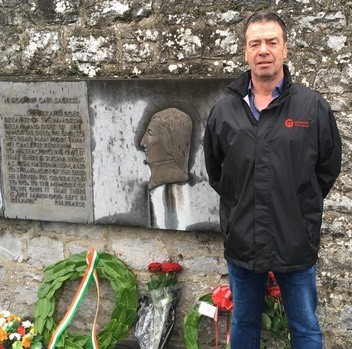 John Douglas, general secretary of Mandate, main speaker at united commemoration for Wolfe Tone in Bodenstown on 20th August 2017.
John Douglas, general secretary of Mandate, main speaker at united commemoration for Wolfe Tone in Bodenstown on 20th August 2017.
A recent feature in the Financial Times might cause some surprise among Ireland’s eight thousand homeless, or the many others struggling with the spiralling cost of renting even modest accommodation.
The article reported that the Republic is now enjoying one of the most remarkable economic revivals the European Union has seen, and that the country’s sovereign borrowing costs are now the same as those of France.
This piece of good news, for some at least, was part of a recent “Person in the News” article that gave a glowing account of the new taoiseach, Leo “early rising” Varadkar.¹ The article contained the type of trite nonsense more often produced by Varadkar’s social-media spin machine. Young, handsome, clubbable, assertive prime minister, and—wait for it—“probably more centre-right as opposed to the non-ideological person which Enda Kenny was.”
Well, there you have it: journalistic licence at its most unperceptive. To speculate that any leader of Fine Gael could possibly be “non-ideological” requires a lively imagination, but to suggest that Leo Varadkar might be centre-right is to do a hard-line neo-liberal a grave injustice.
For almost three decades after the beginning of the Thatcher-Reagan era’s onslaught on working people’s rights and entitlements, capitalist ruling classes everywhere were able to maintain control and hold the political high ground.
They achieved this through a combination of factors. The collapse of socialist states in eastern Europe removed the threat of a competitive alternative. Their control of media and educational institutions granted the world’s oligarchs an almost uncontested telling of the political and economic narrative. Moreover, the creation of unlimited and ultimately unsustainable credit provided an illusion of prosperity and dynamism that offset opposition from the left, or indeed words of caution from the small number of critical classical free-market economists.
The political calm enjoyed and exploited by capitalism’s elite ended with the economic crisis heralded by the collapse of Lehman Brothers and the subsequent imposition of what is euphemistically called austerity. Working people in Europe, the United States and elsewhere reacted angrily to a brutal attack on their standard of living and challenged the legitimacy of the status quo. While the response over the entire spectrum of the working class has not always been progressive, it is nevertheless of concern to the ruling elite.
Consequently, we are now seeing the emergence of a twin-track strategy from within capitalism. Firstly, there is the emergence of reactionary politicians posing as non-ideological centrists. Leo Varadkar and the promotional propaganda he generates exemplify this phenomenon in Ireland.

Secondly, and almost invisibly, there is a subversive and corrosive campaign to legislate for and implement free-market trade agreements beneficial only to global corporate giants. While Donald Trump spoke loudly during his presidential campaign of ending such agreements, he has not made good on his boast since arriving in the White House. Although he stalled development on the Transatlantic Trade and Investment Partnership (TTIP) between the EU and the United States and the Trans-Pacific Partnership (TPP), almost all other trade deals remain in place.
And now, in another spectacular U-turn, his associates are intent on resuming negotiations in September on a pernicious treaty called the Trade in Services Agreement (TISA).
State-appointed delegates from twenty-two countries, together with the EU, represented by its Commission, have been meeting in secret in Geneva since 2013. Regrettably, the Irish state is complicit in this scheme, about which the EU’s own web site says: “Like any other trade negotiations, the TiSA talks are not carried out in public and the documents are available to participants only . . .”
What we do know is drawn from leaked sources obtained by the International Trade Union Confederation and published in a report, “All About TISA.”² This report tells us that TISA would (a) lead to a massive transfer of power from governments to transnational corporations, (b) lead to strangulation of the regulation of banks and finance, and (c) hasten the “Uberisation” of many more jobs.
Moreover, there is heavy emphasis on an all-encompassing locked-in clause, which simply means that, once enacted, there would be no retracting any aspect of the treaty.
Any such trade pact would have detrimental consequences for Ireland. Not only would transnationals, such as Shell and Apple, gain increasing influence within the state but also our already limited ability to control the financial sector would disappear completely. Interestingly, Scott Sinclair, a senior researcher with the Canadian Centre for Policy Alternatives, now argues that TISA would also make it harder for governments to regulate vital services, such as energy and water³—a barely visible clause that would potentially offer the Varadkar-led Fine Gael–Fianna Fáil axis a vehicle with which to reverse the gains made by the campaign against the water tax.
As a Swiss trade unionist recently said, despairingly, if this treaty is implemented national parliaments become virtually irrelevant, and popular sovereignty is grabbed by transnational capital.
Fortunately, though, all is not lost, and there is an answer to our difficulties. The above-mentioned water campaign provides a lesson in how to organise a peaceful and democratic mass movement capable of foiling the designs of neo-liberalism.
Moreover, we have witnessed recently the beginning of an encouraging and indeed significant coming together of crucial progressive forces. Rallying under the slogan Unity of our people, unity of progressive forces, unity of our country, communists, republicans and trade unionists came together to hear a leading trade unionist, John Douglas, deliver an inspirational oration at the grave of Theobald Wolfe Tone.
A central theme of the speech was the need to build a progressive movement in order to reverse the damage done by neo-liberal austerity in general and to prevent specific attacks on workers, such as the TISA treaty. “There is an untapped hunger for change and justice in Ireland that we need to give expression to,” he said, “. . . and we can only do this through the unity of progressive forces.” He went on to add: “Our task now is to build from the ground up, to educate, to agitate. We need to build a movement that is capable and confident and which grows with every victory.”
John Douglas has undoubtedly got it right. To build a movement sufficiently confident and capable of opposing and overcoming the neo-liberal agenda we must create unity among progressive forces. The recent united commemoration for Wolfe Tone was not only a positive first step along this road but indicated the real potential that exists.
Evidence of success will be when a future Financial Times “Person in the News” article publishes the story of a leading Irish trade unionist who is causing as much distress for capital as Varadkar is providing for its comfort today.
This article first appeared in Socialist Voice Sept 2017
1. Laura Noonan, “The bright young man leading an Irish revival,” Financial Times, 19 August 2017.
2. (a) International Trade Union Confederation, “All about TiSA” (www.ituc-csi.org/all-about-tisa); (b) further information is available on the UNI Global Union web site (http://bit.ly/1Qlw9xf).
3. Scott Sinclair, “TISA Troubles: Services, Democracy and Corporate Rule in the Trump Era,” Rosa Luxemburg Institute (www.rosalux.eu).
 Tommy McKearney is a trade union activist and author of The Provisional IRA: From Insurrection To Parliament.
Tommy McKearney is a trade union activist and author of The Provisional IRA: From Insurrection To Parliament.
Follow Tommy McKearney on Twitter @Tommymckearney


 John Douglas, general secretary of Mandate, main speaker at united commemoration for Wolfe Tone in Bodenstown on 20th August 2017.
John Douglas, general secretary of Mandate, main speaker at united commemoration for Wolfe Tone in Bodenstown on 20th August 2017.A recent feature in the Financial Times might cause some surprise among Ireland’s eight thousand homeless, or the many others struggling with the spiralling cost of renting even modest accommodation.
The article reported that the Republic is now enjoying one of the most remarkable economic revivals the European Union has seen, and that the country’s sovereign borrowing costs are now the same as those of France.
This piece of good news, for some at least, was part of a recent “Person in the News” article that gave a glowing account of the new taoiseach, Leo “early rising” Varadkar.¹ The article contained the type of trite nonsense more often produced by Varadkar’s social-media spin machine. Young, handsome, clubbable, assertive prime minister, and—wait for it—“probably more centre-right as opposed to the non-ideological person which Enda Kenny was.”
Well, there you have it: journalistic licence at its most unperceptive. To speculate that any leader of Fine Gael could possibly be “non-ideological” requires a lively imagination, but to suggest that Leo Varadkar might be centre-right is to do a hard-line neo-liberal a grave injustice.
For almost three decades after the beginning of the Thatcher-Reagan era’s onslaught on working people’s rights and entitlements, capitalist ruling classes everywhere were able to maintain control and hold the political high ground.
They achieved this through a combination of factors. The collapse of socialist states in eastern Europe removed the threat of a competitive alternative. Their control of media and educational institutions granted the world’s oligarchs an almost uncontested telling of the political and economic narrative. Moreover, the creation of unlimited and ultimately unsustainable credit provided an illusion of prosperity and dynamism that offset opposition from the left, or indeed words of caution from the small number of critical classical free-market economists.
The political calm enjoyed and exploited by capitalism’s elite ended with the economic crisis heralded by the collapse of Lehman Brothers and the subsequent imposition of what is euphemistically called austerity. Working people in Europe, the United States and elsewhere reacted angrily to a brutal attack on their standard of living and challenged the legitimacy of the status quo. While the response over the entire spectrum of the working class has not always been progressive, it is nevertheless of concern to the ruling elite.
Consequently, we are now seeing the emergence of a twin-track strategy from within capitalism. Firstly, there is the emergence of reactionary politicians posing as non-ideological centrists. Leo Varadkar and the promotional propaganda he generates exemplify this phenomenon in Ireland.

Secondly, and almost invisibly, there is a subversive and corrosive campaign to legislate for and implement free-market trade agreements beneficial only to global corporate giants. While Donald Trump spoke loudly during his presidential campaign of ending such agreements, he has not made good on his boast since arriving in the White House. Although he stalled development on the Transatlantic Trade and Investment Partnership (TTIP) between the EU and the United States and the Trans-Pacific Partnership (TPP), almost all other trade deals remain in place.
And now, in another spectacular U-turn, his associates are intent on resuming negotiations in September on a pernicious treaty called the Trade in Services Agreement (TISA).
State-appointed delegates from twenty-two countries, together with the EU, represented by its Commission, have been meeting in secret in Geneva since 2013. Regrettably, the Irish state is complicit in this scheme, about which the EU’s own web site says: “Like any other trade negotiations, the TiSA talks are not carried out in public and the documents are available to participants only . . .”
What we do know is drawn from leaked sources obtained by the International Trade Union Confederation and published in a report, “All About TISA.”² This report tells us that TISA would (a) lead to a massive transfer of power from governments to transnational corporations, (b) lead to strangulation of the regulation of banks and finance, and (c) hasten the “Uberisation” of many more jobs.
Moreover, there is heavy emphasis on an all-encompassing locked-in clause, which simply means that, once enacted, there would be no retracting any aspect of the treaty.
Any such trade pact would have detrimental consequences for Ireland. Not only would transnationals, such as Shell and Apple, gain increasing influence within the state but also our already limited ability to control the financial sector would disappear completely. Interestingly, Scott Sinclair, a senior researcher with the Canadian Centre for Policy Alternatives, now argues that TISA would also make it harder for governments to regulate vital services, such as energy and water³—a barely visible clause that would potentially offer the Varadkar-led Fine Gael–Fianna Fáil axis a vehicle with which to reverse the gains made by the campaign against the water tax.
As a Swiss trade unionist recently said, despairingly, if this treaty is implemented national parliaments become virtually irrelevant, and popular sovereignty is grabbed by transnational capital.
Fortunately, though, all is not lost, and there is an answer to our difficulties. The above-mentioned water campaign provides a lesson in how to organise a peaceful and democratic mass movement capable of foiling the designs of neo-liberalism.
Moreover, we have witnessed recently the beginning of an encouraging and indeed significant coming together of crucial progressive forces. Rallying under the slogan Unity of our people, unity of progressive forces, unity of our country, communists, republicans and trade unionists came together to hear a leading trade unionist, John Douglas, deliver an inspirational oration at the grave of Theobald Wolfe Tone.
A central theme of the speech was the need to build a progressive movement in order to reverse the damage done by neo-liberal austerity in general and to prevent specific attacks on workers, such as the TISA treaty. “There is an untapped hunger for change and justice in Ireland that we need to give expression to,” he said, “. . . and we can only do this through the unity of progressive forces.” He went on to add: “Our task now is to build from the ground up, to educate, to agitate. We need to build a movement that is capable and confident and which grows with every victory.”
John Douglas has undoubtedly got it right. To build a movement sufficiently confident and capable of opposing and overcoming the neo-liberal agenda we must create unity among progressive forces. The recent united commemoration for Wolfe Tone was not only a positive first step along this road but indicated the real potential that exists.
Evidence of success will be when a future Financial Times “Person in the News” article publishes the story of a leading Irish trade unionist who is causing as much distress for capital as Varadkar is providing for its comfort today.
This article first appeared in Socialist Voice Sept 2017
1. Laura Noonan, “The bright young man leading an Irish revival,” Financial Times, 19 August 2017.
2. (a) International Trade Union Confederation, “All about TiSA” (www.ituc-csi.org/all-about-tisa); (b) further information is available on the UNI Global Union web site (http://bit.ly/1Qlw9xf).
3. Scott Sinclair, “TISA Troubles: Services, Democracy and Corporate Rule in the Trump Era,” Rosa Luxemburg Institute (www.rosalux.eu).
 Tommy McKearney is a trade union activist and author of The Provisional IRA: From Insurrection To Parliament.
Tommy McKearney is a trade union activist and author of The Provisional IRA: From Insurrection To Parliament.Follow Tommy McKearney on Twitter @Tommymckearney


Published on January 31, 2018 01:00
January 30, 2018
Have Grays Thurrock Restaurants Been Breaking The Disability Laws?
Mick Hall tackles discrimination against disabled people in his home patch.
The woman in question lives an independent life, and travels into the borough to work daily by train. The dog sits by her desk during the working day.
It was an outrage that this woman due to her disability was being excluded from restaurants as there is absolutely no reason why the dog would not have done the same in the restaurants from which it was excluded.
Access for disabled people has improved in recent years, but the fact this young woman was refused access to a restaurant just highlights how much more needs to be done.
Thankfully her and her friends night out was not spoiled as the New Delhi in Orsett road Grays was more than happy to let the guide dog onto their premises and a good time was had by all.
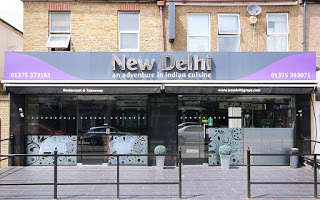 The New Delhi restaurant which saved the day by having Wheelchair Access And Disable Facilities.
The New Delhi restaurant which saved the day by having Wheelchair Access And Disable Facilities.
However there are wider issues here it's against the law for service providers to treat people with disabilities less favourably because of their disability, or because they have a guide or assistance dog with them.
According to Assistance Dogs UK:
This act is clearly not being implemented in some of Thurrock's restaurants and this Christmas when people come to book a meal members of the disabled section of our community must not be stopped from joining the celebrations.
A United Nations panel recently criticises the UK government's failure to uphold disabled people's rights
Patrick Butler wrote in the Guardian:
Whether officers of Thurrock Council regularly check local restaurants are abiding by the Equality Act I am unable to find out, but if not they should immediately do a tour of Thurrock's restaurants to point out they must abide with the Equality Act of 2010 as not to do so is breaking the law.
 Mick Hall blogs @ Organized Rage.
Mick Hall blogs @ Organized Rage.
Follow Mick Hall on Twitter @organizedrage


The woman in question lives an independent life, and travels into the borough to work daily by train. The dog sits by her desk during the working day.
It was an outrage that this woman due to her disability was being excluded from restaurants as there is absolutely no reason why the dog would not have done the same in the restaurants from which it was excluded.
Access for disabled people has improved in recent years, but the fact this young woman was refused access to a restaurant just highlights how much more needs to be done.
Thankfully her and her friends night out was not spoiled as the New Delhi in Orsett road Grays was more than happy to let the guide dog onto their premises and a good time was had by all.
 The New Delhi restaurant which saved the day by having Wheelchair Access And Disable Facilities.
The New Delhi restaurant which saved the day by having Wheelchair Access And Disable Facilities. However there are wider issues here it's against the law for service providers to treat people with disabilities less favourably because of their disability, or because they have a guide or assistance dog with them.
According to Assistance Dogs UK:
Making “reasonable adjustments” might mean giving extra help, such as guiding someone to a restaurant table, or making some changes to the way you provide your services to make it easier for blind and partially-sighted people to use them. It certainly includes allowing guide dogs and assistance dogs into all public places with their owners. Guide dog and assistance dog owners have important rights under the Equality Act 2010. The EA provides for disabled people to have the same right to services supplied by shops, banks, hotels, libraries, pubs, taxis and restaurants as everyone else.
This act is clearly not being implemented in some of Thurrock's restaurants and this Christmas when people come to book a meal members of the disabled section of our community must not be stopped from joining the celebrations.
A United Nations panel recently criticises the UK government's failure to uphold disabled people's rights
Patrick Butler wrote in the Guardian:
The UN committee on the Rights of Persons with Disabilities examined the government’s progress in fulfilling its commitments to the UN convention on disabled people’s rights, to which the UK has been a signatory since 2007.
Its report concludes that the UK has not done enough to ensure the convention – which enshrines the rights of disabled people to live independently, to work and to enjoy social protection without discrimination – is reflected in UK law and policy.
At national local level the authorities are clearly failing disabled people, what happened when a group of women tried to book a meal in Grays simply highlights there failure. That an independent woman was unable to enter a restaurant for a meal with friends is an outrage, it reeks of ignorance but it's more than that, it's a criminal offence and high time the local authorities started taken this seriously.
Whether officers of Thurrock Council regularly check local restaurants are abiding by the Equality Act I am unable to find out, but if not they should immediately do a tour of Thurrock's restaurants to point out they must abide with the Equality Act of 2010 as not to do so is breaking the law.
 Mick Hall blogs @ Organized Rage.
Mick Hall blogs @ Organized Rage.Follow Mick Hall on Twitter @organizedrage


Published on January 30, 2018 13:18
Sinn Féin Silence On Barry McElduff Leaves Much To Be Desired
Sean Bresnahan argues that Barry McElduff was hard done by.
Where was this same support for Barry, who needed and deserved it more than anyone? Sadly it was nowhere to be found, with his eldest daughter left to lead his defence on her own. There is surely something shameful in that, with local Councillors Glenn Campbell and Stevie McCann the only ones man enough to publicly offer support. And fair play to them both, for it was the right and proper thing to do.
There is something awry, though, in regard to the actions — or lack of — of the rest of the party’s hierarchy here in Tyrone, made only the more striking given their newfound social media voices today. There is something deeply distasteful to it all because, for me, Republicanism has always meant ‘no man left behind’. That, of course, has long changed but it is what it is no matter.
Having known Barry from my earliest days with the Republican Movement, though now in disagreement over Republican strategy, how things turned out for him have been difficult to watch. I know in my heart there is no way on earth that the video he made was an attack on the Kingsmill families — and so too do his supposed colleagues, who sat stum until after the fact, abandoning him when he needed them most.
Ultimately, Barry McElduff is many things to many different people and more so now than ever. But to me he is — and will always be — a good man. A worker for the people, many who criticise him would have no concept of his efforts for the ordinary folk of this area, most of which were never publicised for personal political gain. He just done the job.
Anything I’ve ever had to say about Barry, especially when being critical, I said it straight to his face. I’d like to think it was likewise, on his part, in regards to myself. Either way, for the significant role he played in the early years of my development as a Republican I take this opportunity to say thanks.
No matter our differences over the past few years, none of which spilled over into the personal — unlike with some others — I wish him and his family only the best as they move now into a new and unheralded period of their lives. When all is said, and as I know from my own experiences, family is the only thing you can count on in the end. Indeed, at the finish, it’s the only thing that does count.
 Sean Bresnahan blogs at An Claidheamh Soluis
Sean Bresnahan blogs at An Claidheamh Soluis
Follow Sean Bresnahan on Twitter @bres79


Where was this same support for Barry, who needed and deserved it more than anyone? Sadly it was nowhere to be found, with his eldest daughter left to lead his defence on her own. There is surely something shameful in that, with local Councillors Glenn Campbell and Stevie McCann the only ones man enough to publicly offer support. And fair play to them both, for it was the right and proper thing to do.
There is something awry, though, in regard to the actions — or lack of — of the rest of the party’s hierarchy here in Tyrone, made only the more striking given their newfound social media voices today. There is something deeply distasteful to it all because, for me, Republicanism has always meant ‘no man left behind’. That, of course, has long changed but it is what it is no matter.
Having known Barry from my earliest days with the Republican Movement, though now in disagreement over Republican strategy, how things turned out for him have been difficult to watch. I know in my heart there is no way on earth that the video he made was an attack on the Kingsmill families — and so too do his supposed colleagues, who sat stum until after the fact, abandoning him when he needed them most.
Ultimately, Barry McElduff is many things to many different people and more so now than ever. But to me he is — and will always be — a good man. A worker for the people, many who criticise him would have no concept of his efforts for the ordinary folk of this area, most of which were never publicised for personal political gain. He just done the job.
Anything I’ve ever had to say about Barry, especially when being critical, I said it straight to his face. I’d like to think it was likewise, on his part, in regards to myself. Either way, for the significant role he played in the early years of my development as a Republican I take this opportunity to say thanks.
No matter our differences over the past few years, none of which spilled over into the personal — unlike with some others — I wish him and his family only the best as they move now into a new and unheralded period of their lives. When all is said, and as I know from my own experiences, family is the only thing you can count on in the end. Indeed, at the finish, it’s the only thing that does count.
 Sean Bresnahan blogs at An Claidheamh Soluis
Sean Bresnahan blogs at An Claidheamh Soluis
Follow Sean Bresnahan on Twitter @bres79


Published on January 30, 2018 01:00
January 29, 2018
Return The Writings Of Bobby Sands
From The Transcripts:
John McDonagh RFÉ 13 January 2018 offers condolences and comment on the death of Rosaleen Sands. (May she rest in peace.)
New York City (begins time stamp ~ 10:14)Audio Player00:0001:36Use Up/Down Arrow keys to increase or decrease volume. Rosaleen Sands in 1981Photo: 1798 GreenFlag 1916 John: Radio Free Éireann sends its condolences out to the Sands Family and we have a long connection with the Sands Family, in particular with Bernadette – that when she came over to New York she did the show up at WBAI and she got to meet and hang out with Grandpa
Rosaleen Sands in 1981Photo: 1798 GreenFlag 1916 John: Radio Free Éireann sends its condolences out to the Sands Family and we have a long connection with the Sands Family, in particular with Bernadette – that when she came over to New York she did the show up at WBAI and she got to meet and hang out with Grandpa
Al Lewis and go around the tri-state area and we’ve often had her on as a guest throughout the ’80’s and ’90’s and it was a valuable resource to have them.
But with the death of the mother you see a lot of the hypocrisy that’s going on in people sending out different condolences and particularly irritating – there’s an organisation out of Belfast called the Bobby Sands Trust which is run by, on the board of directors, by a millionaire named Gerry Adams and also Danny Morrison – and they issued a statement of condolences. But if they really were sincere about the condolences they would finish-up the Bobby Sands Trust and not do and sell his life and legacy into books and films and I just wanted to read a statement that the Sands Family had put out and you can get it in The Guardian. It says:
So, if they really want to send condolences they can wind-up and give back all the writings of Bobby Sands back to the Sands Family.
(ends time stamp ~ 11:50)


John McDonagh RFÉ 13 January 2018 offers condolences and comment on the death of Rosaleen Sands. (May she rest in peace.)
New York City (begins time stamp ~ 10:14)Audio Player00:0001:36Use Up/Down Arrow keys to increase or decrease volume.
 Rosaleen Sands in 1981Photo: 1798 GreenFlag 1916 John: Radio Free Éireann sends its condolences out to the Sands Family and we have a long connection with the Sands Family, in particular with Bernadette – that when she came over to New York she did the show up at WBAI and she got to meet and hang out with Grandpa
Rosaleen Sands in 1981Photo: 1798 GreenFlag 1916 John: Radio Free Éireann sends its condolences out to the Sands Family and we have a long connection with the Sands Family, in particular with Bernadette – that when she came over to New York she did the show up at WBAI and she got to meet and hang out with GrandpaAl Lewis and go around the tri-state area and we’ve often had her on as a guest throughout the ’80’s and ’90’s and it was a valuable resource to have them.
But with the death of the mother you see a lot of the hypocrisy that’s going on in people sending out different condolences and particularly irritating – there’s an organisation out of Belfast called the Bobby Sands Trust which is run by, on the board of directors, by a millionaire named Gerry Adams and also Danny Morrison – and they issued a statement of condolences. But if they really were sincere about the condolences they would finish-up the Bobby Sands Trust and not do and sell his life and legacy into books and films and I just wanted to read a statement that the Sands Family had put out and you can get it in The Guardian. It says:
The Sands Family once again reiterates that the Bobby Sands Trust does not act on behalf of Bobby, nor does it represent our family, in any way, shape or form. We again call upon the trust to disband and to desist from using Bobby’s memory as a commercial enterprise.
So, if they really want to send condolences they can wind-up and give back all the writings of Bobby Sands back to the Sands Family.
(ends time stamp ~ 11:50)


Published on January 29, 2018 11:52
Into The Heart Of Darkness
January 27 marked the anniversary of the liberation of the Nazis’ most horrific extermination camp – Auschwitz Birkenau. It was also International Holocaust Memorial Day. Political commentator, Dr John Coulter, uses his Fearless Flying Column today to outlines his own emotional and nightmarish trip to the camp in Poland as part of those commemorations.
In 40 years of being a journalist, I have ever only been made physically ill by an assignment twice in those four decades.
 Prison hair – a memorial of hair of many of the 1.5 million slaughtered at Auschwitz.
Prison hair – a memorial of hair of many of the 1.5 million slaughtered at Auschwitz.
Once was after a fundamentalist pro-life group showed a film of a termination just after we had enjoyed a complimentary supper meal in a church, but that’s a debate for another day. The other was during my visit to the Auschwitz Birkenau death camp in Poland.
I had seen the terrible footage in documentaries about the Nazis’ Final Solution, but to actually be present in one of those camps was a radically different experience. I knew to expect an awful feeling. That had stemmed from my family’s friendship with former Ulster Unionist Party leader, the late James Molyneaux.
He was a frequent visitor to our house, and whilst he could talk openly about his experiences in the Second World War, the conversation would rapidly be changed once the topic turned to his experience at the liberation of the Bergen-Belsen concentration camp in Germany in 1945. It soon became a taboo subject of chat.
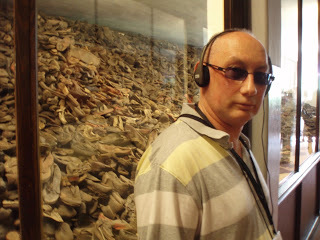 Shoes – Political columnist John Coulter stands inside one of the Auschwitz buildings where a memorial composed of the shoes of many of the camp’s 1.5 million victims has been erected.
Shoes – Political columnist John Coulter stands inside one of the Auschwitz buildings where a memorial composed of the shoes of many of the camp’s 1.5 million victims has been erected.
Back in Ireland, when telling audiences about my visit to a death camp, I’ve tried to explain the numbers in terms of comparing it – rightly or wrongly – to the Irish Troubles.
Just imagine the 3,000 people who died in the Irish Troubles being slaughtered in 30 minutes – that’s what the Nazis had perfected in their death camp in Poland, Auschwitz Birkenau.
January 27 marks the anniversary of the liberation of the camp by the Russians in 1945 during the final months of World War Two.
Although it was only operational for a handful of years during that war, an estimated one and a half million men, women and children were slaughtered in at Auschwitz using gas, firing squad, torture, horrific medical experiments, hanging, starvation and illness.
In terms of the Nazis Final Solution to eliminate Europe’s Jews, Auschwitz was Hitler’s jewel in the crown of his murder machine.
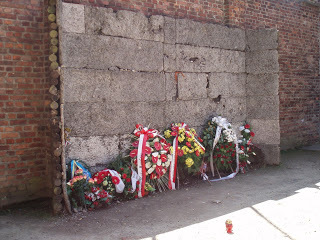 Execution wall – floral memorials now stand at the notorious execution wall beside the Nazi officers’ quarters where victims were murdered by firing squad.
Execution wall – floral memorials now stand at the notorious execution wall beside the Nazi officers’ quarters where victims were murdered by firing squad.
Hitler’s SS thugs set up two types of concentration camps – a labour camp to supply slave workers, and a death camp, which had only one aim; mass murder.
The tour of the Auschwitz camp lasts around four hours. It will be a roller coaster emotional journey to hell and back again.
Having covered the Irish conflict for more than 30 years, I wrongly believed this experience would prepare me for visiting Auschwitz.
I even watched blockbuster movies on such camps, such as Schindler’s List, starring Irish screen legend Liam Neeson; The Boy In The Stripped Pyjamas, as well as the renowned documentary series The World at War.
Our hotel was an hour’s drive from the camp, but I became engulfed by a dreadful uneasiness as we approached it. Then it hit me.
As I walked through the gates with the notorious metal sign – Work Shall Set You Free – in German, I had to run out again to vomit in the visitors’ centre. My own personal Auschwitz nightmare was underway.
It was a bright, sunny summer’s day and thousands of people were visiting the camp. But this is not a tourist attraction; this is a memorial to man’s inhumanity to man. Indeed, a visit to the camp is more like a pilgrimage to gain a clear feeling of the depths to which man can sink when it comes to the slaughter of fellow humans.
Out of respect for the murdered, we don head sets to enable us to hear the whispers of the tour guide as we visit the various areas of the camp.
No one shouts; no one even talks loudly. Every building is a piece in a jigsaw of mass murder. And the emotional turmoil for the visitor deepens as we visit each cell, each room, each corridor, and each execution yard.
Even inside the buildings I wear my sunglasses to prevent people see me weep are I walk the corridors lined with photos of the victims. Then I realise many others are weeping too at the horrors which out tour guides unfold to us.
It is not merely words – it is clear images; the suit cases of the victims piled high; the hair cut from the victims; the execution wall where people were shot.
Eventually I am composed enough to get my photo taken with the shoes of tens of thousands of victims behind me.
Worse follows. We travel to the Birkenau section to see the beds where victims were held before slaughter. The Nazis tried to cover their tracks by blowing up some of the gas chambers. We see the ruins as they have been left – alongside the ashpit where the remains of the dead were dumped.
Even worse follows. We are taken into a gas chamber. Although it contains a massive memorial wreath, I look skywards to the vents as if I was expecting people to drop the poison gas pellets down.
Then the door slams behind me and for a few terrifying seconds, I experience the petrifying sensation that this is not a shower room, but a room of death. Thankfully, the door is opened and we walk out to see the crematoriums – except the victims’ bodies would have been carried out.
Only one aspect of the camp is off limits – the house of the camp commandant for fear it could become an iconic symbol for neo-Nazis.
But unlike one and a half million other humans, I walk out of Auschwitz. In spite of the warm summer afternoon, my gentle dander becomes a steadily hurried rush as I almost race towards the bus to take me back to the hotel.
And unfortunately, for some neo-Nazis, a trip to the gas chamber has an inhuman meaning. During the time I was there, two young men had their photos taken beside the crematoriums – complete with sick thumbs-up gestures and beaming grins.
But I had been given a glimpse of a man-made Hell. I still have nightmares every January around the commemoration of International Holocaust Memorial Day.
In spite of the nightmarish experience, it is one pilgrimage which I recommend everyone takes at least once in their lives. It will leave you in no doubt about the evils of racism.
 John Coulter is a unionist political commentator and former Blanket columnist.
John Coulter is a unionist political commentator and former Blanket columnist.
John Coulter is also author of ‘ An Sais Glas: (The Green Sash): The Road to National Republicanism’, which is available on Amazon Kindle.
Follow John Coulter on Twitter @JohnAHCoulter


In 40 years of being a journalist, I have ever only been made physically ill by an assignment twice in those four decades.
 Prison hair – a memorial of hair of many of the 1.5 million slaughtered at Auschwitz.
Prison hair – a memorial of hair of many of the 1.5 million slaughtered at Auschwitz.
Once was after a fundamentalist pro-life group showed a film of a termination just after we had enjoyed a complimentary supper meal in a church, but that’s a debate for another day. The other was during my visit to the Auschwitz Birkenau death camp in Poland.
I had seen the terrible footage in documentaries about the Nazis’ Final Solution, but to actually be present in one of those camps was a radically different experience. I knew to expect an awful feeling. That had stemmed from my family’s friendship with former Ulster Unionist Party leader, the late James Molyneaux.
He was a frequent visitor to our house, and whilst he could talk openly about his experiences in the Second World War, the conversation would rapidly be changed once the topic turned to his experience at the liberation of the Bergen-Belsen concentration camp in Germany in 1945. It soon became a taboo subject of chat.
 Shoes – Political columnist John Coulter stands inside one of the Auschwitz buildings where a memorial composed of the shoes of many of the camp’s 1.5 million victims has been erected.
Shoes – Political columnist John Coulter stands inside one of the Auschwitz buildings where a memorial composed of the shoes of many of the camp’s 1.5 million victims has been erected.Back in Ireland, when telling audiences about my visit to a death camp, I’ve tried to explain the numbers in terms of comparing it – rightly or wrongly – to the Irish Troubles.
Just imagine the 3,000 people who died in the Irish Troubles being slaughtered in 30 minutes – that’s what the Nazis had perfected in their death camp in Poland, Auschwitz Birkenau.
January 27 marks the anniversary of the liberation of the camp by the Russians in 1945 during the final months of World War Two.
Although it was only operational for a handful of years during that war, an estimated one and a half million men, women and children were slaughtered in at Auschwitz using gas, firing squad, torture, horrific medical experiments, hanging, starvation and illness.
In terms of the Nazis Final Solution to eliminate Europe’s Jews, Auschwitz was Hitler’s jewel in the crown of his murder machine.
 Execution wall – floral memorials now stand at the notorious execution wall beside the Nazi officers’ quarters where victims were murdered by firing squad.
Execution wall – floral memorials now stand at the notorious execution wall beside the Nazi officers’ quarters where victims were murdered by firing squad. Hitler’s SS thugs set up two types of concentration camps – a labour camp to supply slave workers, and a death camp, which had only one aim; mass murder.
The tour of the Auschwitz camp lasts around four hours. It will be a roller coaster emotional journey to hell and back again.
Having covered the Irish conflict for more than 30 years, I wrongly believed this experience would prepare me for visiting Auschwitz.
I even watched blockbuster movies on such camps, such as Schindler’s List, starring Irish screen legend Liam Neeson; The Boy In The Stripped Pyjamas, as well as the renowned documentary series The World at War.
Our hotel was an hour’s drive from the camp, but I became engulfed by a dreadful uneasiness as we approached it. Then it hit me.
As I walked through the gates with the notorious metal sign – Work Shall Set You Free – in German, I had to run out again to vomit in the visitors’ centre. My own personal Auschwitz nightmare was underway.
It was a bright, sunny summer’s day and thousands of people were visiting the camp. But this is not a tourist attraction; this is a memorial to man’s inhumanity to man. Indeed, a visit to the camp is more like a pilgrimage to gain a clear feeling of the depths to which man can sink when it comes to the slaughter of fellow humans.
Out of respect for the murdered, we don head sets to enable us to hear the whispers of the tour guide as we visit the various areas of the camp.
No one shouts; no one even talks loudly. Every building is a piece in a jigsaw of mass murder. And the emotional turmoil for the visitor deepens as we visit each cell, each room, each corridor, and each execution yard.
Even inside the buildings I wear my sunglasses to prevent people see me weep are I walk the corridors lined with photos of the victims. Then I realise many others are weeping too at the horrors which out tour guides unfold to us.
It is not merely words – it is clear images; the suit cases of the victims piled high; the hair cut from the victims; the execution wall where people were shot.
Eventually I am composed enough to get my photo taken with the shoes of tens of thousands of victims behind me.
Worse follows. We travel to the Birkenau section to see the beds where victims were held before slaughter. The Nazis tried to cover their tracks by blowing up some of the gas chambers. We see the ruins as they have been left – alongside the ashpit where the remains of the dead were dumped.
Even worse follows. We are taken into a gas chamber. Although it contains a massive memorial wreath, I look skywards to the vents as if I was expecting people to drop the poison gas pellets down.
Then the door slams behind me and for a few terrifying seconds, I experience the petrifying sensation that this is not a shower room, but a room of death. Thankfully, the door is opened and we walk out to see the crematoriums – except the victims’ bodies would have been carried out.
Only one aspect of the camp is off limits – the house of the camp commandant for fear it could become an iconic symbol for neo-Nazis.
But unlike one and a half million other humans, I walk out of Auschwitz. In spite of the warm summer afternoon, my gentle dander becomes a steadily hurried rush as I almost race towards the bus to take me back to the hotel.
And unfortunately, for some neo-Nazis, a trip to the gas chamber has an inhuman meaning. During the time I was there, two young men had their photos taken beside the crematoriums – complete with sick thumbs-up gestures and beaming grins.
But I had been given a glimpse of a man-made Hell. I still have nightmares every January around the commemoration of International Holocaust Memorial Day.
In spite of the nightmarish experience, it is one pilgrimage which I recommend everyone takes at least once in their lives. It will leave you in no doubt about the evils of racism.
 John Coulter is a unionist political commentator and former Blanket columnist.
John Coulter is a unionist political commentator and former Blanket columnist. John Coulter is also author of ‘ An Sais Glas: (The Green Sash): The Road to National Republicanism’, which is available on Amazon Kindle.
Follow John Coulter on Twitter @JohnAHCoulter


Published on January 29, 2018 02:00
January 28, 2018
Them And Us
Anthony McIntyre reflects on the Barry McElduff controversy.
With Barry McElduff having resigned his Westminster seat, jumped or pushed, his departure has brought the curtain down on a long political career.
Regardless of his intentions, when on the anniversary of the Kingsmill massacre he stuck a Kingsmill loaf on his head and pranced about a shop, there was simply too much doubt for the erstwhile West Tyrone MP to get the benefit of it. His denials, even if genuine, butted with an implacable incredulity. For his account to get over the line people had to believe a triple happenstance: it was the anniversary of the Kingsmill massacre; out of all the bread in the shop he chose a Kingsmill brand; that he was a prominent member of a movement, the military wing of which perpetrated the atrocity forty-two years ago.
In trying to understand unionist anger we would do well to consider a scenario in which the Democratic Unionist Party MP Gregory Campbell larked around in a shop on 30th of January with a Bloody Sundae ice cream on his head. Few in the nationalist community would have listened to his protestations that it was all a series of unfortunate coincidences. At the same time unionism overegged the pudding in going after the scalp of Mairtin O'Muilleoir. All O'Muilleoir did was retweet, claiming that he viewed it as “being wholly apolitical and retweeted it on that basis”. Retweets are hardly an endorsement and the urge to curb them seems censorious.
When I first learned of it I thought the safe money had to be on McElduff knowing what he was doing, perhaps prompted by his party leader to do something to “break these bastards”. The more I listened to McElduff’s republican critics, including some from Tyrone, the more doubt grew in my mind. They were adamant that he would never have risked his political career by doing something so outrageous. What preserved him in their estimation was that to consciously do it was so outrageous that only the politically suicidal would have opted for it. Too many of his political critics came to his defence for their perspective to be easily dismissed.
Whatever the motive, it may be postulated that rather than being sectarian in attitude, O'Muilleoir and McElduff are the outworking of a structural sectarianism. People may be sectarian without even knowing it. We can hardy finger point as few of us mange to rise above the ground we stand on. We are so caught up in the atrocities inflicted on our "own" community that we completely overlook what the "other" community sustained. It is not that we know their fate and are indifferent to it, but that we relegate it in terms of emotional and cultural significance. We treat it as something that we simply have no call to remember. It is not war crimes per se that enrage us, just war crimes that happen to our community.
Them and us, as strong as it ever was.
 Anthony McIntyre blogs @ The Pensive Quill.
Anthony McIntyre blogs @ The Pensive Quill.
Follow Anthony McIntyre on Twitter @AnthonyMcIntyre


With Barry McElduff having resigned his Westminster seat, jumped or pushed, his departure has brought the curtain down on a long political career.
Regardless of his intentions, when on the anniversary of the Kingsmill massacre he stuck a Kingsmill loaf on his head and pranced about a shop, there was simply too much doubt for the erstwhile West Tyrone MP to get the benefit of it. His denials, even if genuine, butted with an implacable incredulity. For his account to get over the line people had to believe a triple happenstance: it was the anniversary of the Kingsmill massacre; out of all the bread in the shop he chose a Kingsmill brand; that he was a prominent member of a movement, the military wing of which perpetrated the atrocity forty-two years ago.
In trying to understand unionist anger we would do well to consider a scenario in which the Democratic Unionist Party MP Gregory Campbell larked around in a shop on 30th of January with a Bloody Sundae ice cream on his head. Few in the nationalist community would have listened to his protestations that it was all a series of unfortunate coincidences. At the same time unionism overegged the pudding in going after the scalp of Mairtin O'Muilleoir. All O'Muilleoir did was retweet, claiming that he viewed it as “being wholly apolitical and retweeted it on that basis”. Retweets are hardly an endorsement and the urge to curb them seems censorious.
When I first learned of it I thought the safe money had to be on McElduff knowing what he was doing, perhaps prompted by his party leader to do something to “break these bastards”. The more I listened to McElduff’s republican critics, including some from Tyrone, the more doubt grew in my mind. They were adamant that he would never have risked his political career by doing something so outrageous. What preserved him in their estimation was that to consciously do it was so outrageous that only the politically suicidal would have opted for it. Too many of his political critics came to his defence for their perspective to be easily dismissed.
Whatever the motive, it may be postulated that rather than being sectarian in attitude, O'Muilleoir and McElduff are the outworking of a structural sectarianism. People may be sectarian without even knowing it. We can hardy finger point as few of us mange to rise above the ground we stand on. We are so caught up in the atrocities inflicted on our "own" community that we completely overlook what the "other" community sustained. It is not that we know their fate and are indifferent to it, but that we relegate it in terms of emotional and cultural significance. We treat it as something that we simply have no call to remember. It is not war crimes per se that enrage us, just war crimes that happen to our community.
Them and us, as strong as it ever was.
 Anthony McIntyre blogs @ The Pensive Quill.
Anthony McIntyre blogs @ The Pensive Quill.Follow Anthony McIntyre on Twitter @AnthonyMcIntyre


Published on January 28, 2018 13:34
Holy Vending Machines
Andrew McArthur writing on the money grabbing racket called religion.
“Take my silver dollar
Break it into quarters
Shove ‘me in the godly machine”
A couple of years back, my wife and I went on vacation to Puerta Vallarta Mexico; get a little sun, get away from it all. Some of you are familiar with the drill. For those who do not indulge in this practice, I highly recommend it. It's good to relax on occasion.
As it happened, prior to our trip we had been discussing the Theory of Evolution. As part of that discussion I showed her a graphic representing the various developmental phases of a Human fetus. To say the least, she was taken aback by the gill slits and the tail, both of which are clearly visible early on. I could tell the image and explanation had impacted her beliefs a bit, but also knew it would take some time for her to process the new information.
It seems everybody gotta have a Cathedral
It's something we do when we go to a place we have never been before; we take a tour of the local city. There's one thing you can't help but notice when visiting any large Latin-American city; everybody has a Cathedral. Not Just a church, a Cathedral. This is an important distinction. Cathedrals tend to be grand displays of religious architecture, whereas churches tend to be significantly less imposing. We usually pop inside for a look and the Cathedral in Puerta Vallarta was no exception. It was ornate. It was opulently festooned with frescos and statues all paying tribute to Jesus or the Madonna ( no, not the rock star! ) all in all, an artistically satisfying experience.
Once we had passed through the heavy wooden doors, I happened to notice immediately to our left was a display of what I took to be the same graphic regarding foetal development I had shown to my wife only a few days before. I say “what I took to be” because a quick glance showed a few notable discrepancies between the instructional tool I had used, as compared to the version the Catholics had chosen to display. Gone were the gill slits! Gone was the tail! Damn, I think maybe it must have been a miracle!
Is ignorance really bliss?
I could see uncertainty blossoming in my wife's expression. I asked her only one question: if they are willing to lie about this, what else do you think they might be lying about?
Fire bad! Live in cave in dark, eat cold food!
Religions have a vested interest in keeping their populations ignorant. More than one study has shown a direct correlation between education and the propensity to believe in god. The thing about knowledge, the actual real thing, is that once most people acquire some, they have a tendency to develop a taste for it. This is obviously anathema to any religious doctrine or dogma, and so god mongers everywhere tend to land one the side of “Fire bad! Live in cave in dark. Eat cold food!” But I digress.
The title of this piece is Holy Vending Machines, not why Religion Loves Ignorance, although that may be an idea for something down the line.
As far as I know, the lighting of candles for the souls of the dead has been a Catholic tradition for centuries. In and of itself, I see no real harm in the practice (other than the harm religion in general inflicts on people,) and of course this service was available at the Cathedral we visited. But there was a catch. The candles in this church were kept under in a clear plastic box, and we're obviously gas fuelled. The box itself was attached to a gizmo which allowed people to insert pesos in order to cause a candle to become lit for a couple of minutes, after which, the flame would go out and the parishioner would move on. The lineup for this version of Dial-A-Prayer did not diminish in size the entire time we were there.
Cha-Ching!
What struck me most about this blatant bit of godly extortion was not the fact it was happening; I know enough about the operations of the Catholic Church to understand that at the end of the day they are not so much concerned with the eternal soul, as they are in maintaining an eternal inflow of money. No, what struck me the most was the obvious lack of economic prosperity evidenced in those who waited patiently in line for the opportunity to do their bit in lining the coffers of this Draconian institution. These were people who could ill afford to give! They were not clad in fine cloth like the members of the clergy. They sported little in the way of gold jewellery ( with the notable exception of the small crucifixes some of them wore in some fashion.) These people were poor.
It made me angry, and still does to this day; the obvious greed of this supposedly godly bunch of priestly pontificators, in stark contrast to the obvious lack of economic success of their prey. Even my wife ( who is a christian ) was shaking her head at the unmitigated gall of these Collection Agents for Christ.
You often hear tell of the good works done by the emissaries of the church. They will unhesitatingly fill your ears with tales of monies and services provided for the poor and downtrodden of this world. What they inevitably fail to mention, is the despicable ways they go about extorting money from those same poor or downtrodden. It's as though I were to tell someone to give me ten dollars, then upon returning five of those dollars to the community, in which they reside, expect praise for my largess. If you need any proof of the disparity between income and outlay of cash in the Roman Catholic Church, I suggest a visit to Vatican City, or you can simply take the time to visit a Cathedral near you.
What's next pay-pews?
 Andrew McArthur is an Atheist Republic blogger and newsletter contributor.
Andrew McArthur is an Atheist Republic blogger and newsletter contributor.


“Take my silver dollar
Break it into quarters
Shove ‘me in the godly machine”
A couple of years back, my wife and I went on vacation to Puerta Vallarta Mexico; get a little sun, get away from it all. Some of you are familiar with the drill. For those who do not indulge in this practice, I highly recommend it. It's good to relax on occasion.
As it happened, prior to our trip we had been discussing the Theory of Evolution. As part of that discussion I showed her a graphic representing the various developmental phases of a Human fetus. To say the least, she was taken aback by the gill slits and the tail, both of which are clearly visible early on. I could tell the image and explanation had impacted her beliefs a bit, but also knew it would take some time for her to process the new information.
It seems everybody gotta have a Cathedral
It's something we do when we go to a place we have never been before; we take a tour of the local city. There's one thing you can't help but notice when visiting any large Latin-American city; everybody has a Cathedral. Not Just a church, a Cathedral. This is an important distinction. Cathedrals tend to be grand displays of religious architecture, whereas churches tend to be significantly less imposing. We usually pop inside for a look and the Cathedral in Puerta Vallarta was no exception. It was ornate. It was opulently festooned with frescos and statues all paying tribute to Jesus or the Madonna ( no, not the rock star! ) all in all, an artistically satisfying experience.
Once we had passed through the heavy wooden doors, I happened to notice immediately to our left was a display of what I took to be the same graphic regarding foetal development I had shown to my wife only a few days before. I say “what I took to be” because a quick glance showed a few notable discrepancies between the instructional tool I had used, as compared to the version the Catholics had chosen to display. Gone were the gill slits! Gone was the tail! Damn, I think maybe it must have been a miracle!
Is ignorance really bliss?
I could see uncertainty blossoming in my wife's expression. I asked her only one question: if they are willing to lie about this, what else do you think they might be lying about?
Fire bad! Live in cave in dark, eat cold food!
Religions have a vested interest in keeping their populations ignorant. More than one study has shown a direct correlation between education and the propensity to believe in god. The thing about knowledge, the actual real thing, is that once most people acquire some, they have a tendency to develop a taste for it. This is obviously anathema to any religious doctrine or dogma, and so god mongers everywhere tend to land one the side of “Fire bad! Live in cave in dark. Eat cold food!” But I digress.
The title of this piece is Holy Vending Machines, not why Religion Loves Ignorance, although that may be an idea for something down the line.
As far as I know, the lighting of candles for the souls of the dead has been a Catholic tradition for centuries. In and of itself, I see no real harm in the practice (other than the harm religion in general inflicts on people,) and of course this service was available at the Cathedral we visited. But there was a catch. The candles in this church were kept under in a clear plastic box, and we're obviously gas fuelled. The box itself was attached to a gizmo which allowed people to insert pesos in order to cause a candle to become lit for a couple of minutes, after which, the flame would go out and the parishioner would move on. The lineup for this version of Dial-A-Prayer did not diminish in size the entire time we were there.
Cha-Ching!
What struck me most about this blatant bit of godly extortion was not the fact it was happening; I know enough about the operations of the Catholic Church to understand that at the end of the day they are not so much concerned with the eternal soul, as they are in maintaining an eternal inflow of money. No, what struck me the most was the obvious lack of economic prosperity evidenced in those who waited patiently in line for the opportunity to do their bit in lining the coffers of this Draconian institution. These were people who could ill afford to give! They were not clad in fine cloth like the members of the clergy. They sported little in the way of gold jewellery ( with the notable exception of the small crucifixes some of them wore in some fashion.) These people were poor.
It made me angry, and still does to this day; the obvious greed of this supposedly godly bunch of priestly pontificators, in stark contrast to the obvious lack of economic success of their prey. Even my wife ( who is a christian ) was shaking her head at the unmitigated gall of these Collection Agents for Christ.
You often hear tell of the good works done by the emissaries of the church. They will unhesitatingly fill your ears with tales of monies and services provided for the poor and downtrodden of this world. What they inevitably fail to mention, is the despicable ways they go about extorting money from those same poor or downtrodden. It's as though I were to tell someone to give me ten dollars, then upon returning five of those dollars to the community, in which they reside, expect praise for my largess. If you need any proof of the disparity between income and outlay of cash in the Roman Catholic Church, I suggest a visit to Vatican City, or you can simply take the time to visit a Cathedral near you.
What's next pay-pews?
 Andrew McArthur is an Atheist Republic blogger and newsletter contributor.
Andrew McArthur is an Atheist Republic blogger and newsletter contributor.

Published on January 28, 2018 01:00
January 27, 2018
Not Terminal But ...
Daithi O’Donnabhain writes about an event he attended in London.
London’s Anti-Internment Group (AIG) Meeting 19/01/17
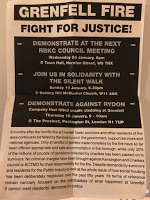
I was an attendee at Friday's meeting of the London Anti-Internment Group (AIG). It seemed to be a joint venture with Turkish activists who were critical of President Erdogan. I didn’t pick up any names of Turkish groups they represented but I was ten minutes late so these might have been given in an introduction I would of missed.
The speaker for the Irish experience was primarily Cait Trainor - I think ex of Republican Sinn Fein. And the topics she covered, political policing in the North and South, an unjust legal system, the surveillance state and the type of experiences a political activist can face in Ireland. The examples of Tony Taylor , the Craigavon Two and simple family man (ahem) Liam Campbell’s extradition to Lithuania were covered closely.
I am not going to cover the Turkish content in the talk in this piece, it was a filmed event, so perhaps those interested in that part can seek it out. The reason for this is I am mindful of bombarding people with too many disparate pieces of information, and this reservation leads me into my main problem with the organisers of the meeting.
After the main talks, an invitation was given for questions from the floor, which others (I think AIG members) took as an opportunity to give a short(ish) biography of themselves and their activism. Another took the opportunity to notify us of some American prison ”lay down” protest that also required our immediate attention at this precise juncture. One of the chairs added that he had a letter from jailed republican activist Christine O’Connor, which prompted another AIG member to announce she had a short letter from a jailed member of the Black Liberation Army she would like to read. It wasn’t short.
Finally, an Irish accent asked about MI5’s role in the North, and how it was crucial to understanding what is going in the North. I was instantly interested when he said he was the guy who had his slipper bugged by the security services (which I remembered reading about because of its novel location), and this prompted a welcome back and forth exchange with Cait on the stage. Unfortunately this was also cut short as the organisers could lose the deposit for the room if we didn’t end the event and leave. I was then handed a leaflet about a Grenfell Tower demo, which I think is ultimately fairly apt. The Irish struggle, the only reason I was there, was allotted a smaller fraction of the evening's attention.
It is hard to critique a meeting for being unfocussed when it is split with another movement (yes , I get the proposition that their struggles aren’t different because both are the result of imperialism), but the additional, unnecessary tangents were not helpful. In her presentation, Cait had already highlighted the apathy within Ireland itself for the fate of its sons and daughters in British jails. It begs the question, how effective asking them to show concern for those in Turkish jails will likely be? How will the organisers measure the efficacy of this approach?
Cait mentioned the benefit of these meetings going out online, meaning they have a wider audience than just those in attendance that evening, and how Republicans should have regular podcasts and a central point for media creation, distribution. I myself have wondered on here why Radio Free Eireann (for example) isn’t available as a podcast, to make it easier to access.
My final thought on the meeting confirmed what I already suspected: the Republican message is better delivered by our women at this stage, for framing the debate in a softer aesthetic.
Nothing I have written here should be taken as terminal. We should all welcome opportunities to do better for the prisoners.

Daithi O’Donnabhain is a frequent commenter to TPQ.


London’s Anti-Internment Group (AIG) Meeting 19/01/17

I was an attendee at Friday's meeting of the London Anti-Internment Group (AIG). It seemed to be a joint venture with Turkish activists who were critical of President Erdogan. I didn’t pick up any names of Turkish groups they represented but I was ten minutes late so these might have been given in an introduction I would of missed.
The speaker for the Irish experience was primarily Cait Trainor - I think ex of Republican Sinn Fein. And the topics she covered, political policing in the North and South, an unjust legal system, the surveillance state and the type of experiences a political activist can face in Ireland. The examples of Tony Taylor , the Craigavon Two and simple family man (ahem) Liam Campbell’s extradition to Lithuania were covered closely.
I am not going to cover the Turkish content in the talk in this piece, it was a filmed event, so perhaps those interested in that part can seek it out. The reason for this is I am mindful of bombarding people with too many disparate pieces of information, and this reservation leads me into my main problem with the organisers of the meeting.
After the main talks, an invitation was given for questions from the floor, which others (I think AIG members) took as an opportunity to give a short(ish) biography of themselves and their activism. Another took the opportunity to notify us of some American prison ”lay down” protest that also required our immediate attention at this precise juncture. One of the chairs added that he had a letter from jailed republican activist Christine O’Connor, which prompted another AIG member to announce she had a short letter from a jailed member of the Black Liberation Army she would like to read. It wasn’t short.
Finally, an Irish accent asked about MI5’s role in the North, and how it was crucial to understanding what is going in the North. I was instantly interested when he said he was the guy who had his slipper bugged by the security services (which I remembered reading about because of its novel location), and this prompted a welcome back and forth exchange with Cait on the stage. Unfortunately this was also cut short as the organisers could lose the deposit for the room if we didn’t end the event and leave. I was then handed a leaflet about a Grenfell Tower demo, which I think is ultimately fairly apt. The Irish struggle, the only reason I was there, was allotted a smaller fraction of the evening's attention.
It is hard to critique a meeting for being unfocussed when it is split with another movement (yes , I get the proposition that their struggles aren’t different because both are the result of imperialism), but the additional, unnecessary tangents were not helpful. In her presentation, Cait had already highlighted the apathy within Ireland itself for the fate of its sons and daughters in British jails. It begs the question, how effective asking them to show concern for those in Turkish jails will likely be? How will the organisers measure the efficacy of this approach?
Cait mentioned the benefit of these meetings going out online, meaning they have a wider audience than just those in attendance that evening, and how Republicans should have regular podcasts and a central point for media creation, distribution. I myself have wondered on here why Radio Free Eireann (for example) isn’t available as a podcast, to make it easier to access.
My final thought on the meeting confirmed what I already suspected: the Republican message is better delivered by our women at this stage, for framing the debate in a softer aesthetic.
Nothing I have written here should be taken as terminal. We should all welcome opportunities to do better for the prisoners.

Daithi O’Donnabhain is a frequent commenter to TPQ.


Published on January 27, 2018 11:07
Radio Free Eireann Broadcasting 27 January 2018
Martin Galvin
with details of this weekend's broadcast from
Radio Free Eireann.
Radio Free Eireann.
will broadcast this Saturday January 27th.Ballymurphy Massacre campaigner John Teggart,will describe his feelings as he and other campaigners sat in the British Parliament and heard Tories and DUP MPs praise a proposed new British law which could prevent any prosecutions of British troopers who murdered 11 people over a three day killing spree.
On the anniversary of his father's death in a British prison, RFE will play a tape of Guildford Four member Gerry Conlon speaking about the incident in a live reading at Rocky Sullivan's.
As we near the St. Patrick's Day season, we will get hear from some of the artists who will be coming to New York to perform.
John McDonagh and Martin Galvin co- host.
Radio Free Eireann is heard Saturdays at 12 Noon New York time on wbai 99.5 FM and wbai.org.
It can be heard at wbai.org in Ireland from 5pm to 6pm or anytime after the program concludes on wbai.org/archives.



On the anniversary of his father's death in a British prison, RFE will play a tape of Guildford Four member Gerry Conlon speaking about the incident in a live reading at Rocky Sullivan's.
As we near the St. Patrick's Day season, we will get hear from some of the artists who will be coming to New York to perform.
John McDonagh and Martin Galvin co- host.
Radio Free Eireann is heard Saturdays at 12 Noon New York time on wbai 99.5 FM and wbai.org.
It can be heard at wbai.org in Ireland from 5pm to 6pm or anytime after the program concludes on wbai.org/archives.



Published on January 27, 2018 01:00
Anthony McIntyre's Blog
- Anthony McIntyre's profile
- 2 followers
Anthony McIntyre isn't a Goodreads Author
(yet),
but they
do have a blog,
so here are some recent posts imported from
their feed.



